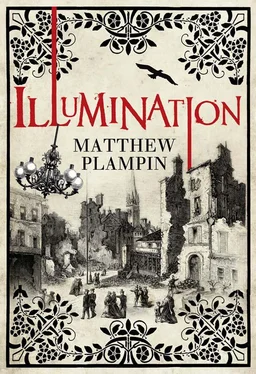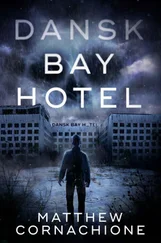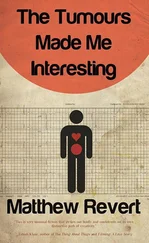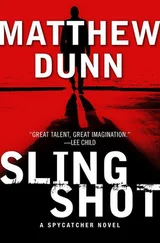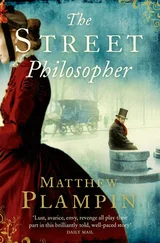‘I thought he’d given it up. You know, after the crash.’
‘He has recovered his nerve,’ Besson said. ‘Nadar considers the balloon, the French mastery of free ballooning, to be a valuable weapon against our enemy. More so, certainly, than the photograph.’ The aérostier turned towards the city. ‘He is airborne now. Right there, above the Buttes Montmartre.’
Clem followed Besson’s pointing finger. Suspended over Paris, over the golden domes and ancient spires and grand boulevards, was a single white sphere, so tiny that it hurt the eyes to pick it out. The basket beneath, the men inside, could not be seen. It looked like a moon that had been fished from the firmament and roped to the earth. Clem stared; he took off his hat. Merely thinking of what it might be like up there, floating alone in that boundless sky, left him dazzled with terror and elation.
‘That one is fixed, of course – for observation only,’ Besson told him, ‘but we have our plans.’
‘Such as what?’ Clem demanded. His mind teemed with visions of bombs being tossed from baskets into the depths of the Prussian positions; of crack troops being delivered straight into the enemy’s headquarters; of cavalry detachments strapped beneath balloons, their hooves dangling in the air. ‘Do tell, Monsieur Besson!’
The Frenchman’s mouth curved downwards, forming a sort of reluctant smile – the first indication that anything resembling a sense of humour might exist within him. ‘We will fly out letters, dispatches, orders to the armies in the provinces. We will bring France together. The Prussians will not silence us, Mr Pardy. We will get word to the world of what they are doing.’
Clem nodded, a little disappointed by this answer. ‘And will you pilot one of these craft yourself?’
‘I will not. We are going to launch a great many balloons, more than the Prussians can count – or chase. Several shops are being set up to make them. There is to be one close to the place Saint-Pierre, in fact, in an abandoned dancing school. That is why I am living there. I shall oversee the work. Train the men who are to fly.’
A balloon workshop in a Montmartre dancing school! It was like one of Clem’s own schemes brought to life. He held out a hand to help the aérostier back to his feet.
‘Monsieur Besson,’ he said, ‘this I really have to see.’
The Café Géricault was on the rue des Acacias, a hundred yards from the place Saint-Pierre. Time was short – the march would be leaving for the boulevards at any moment – but Hannah could not ignore this. It was Lucien who’d directed her there. She’d encountered him in a bustling passage, quite by chance; clothing in disarray, missing his hat and one of his boots, he’d been so battered by drink that he appeared close to expiration. Having rejected her proposal that he join the march in the bluntest terms, he’d informed her that her twin brother had popped up again, not two streets away.
‘He’s with somebody, over in the Géricault,’ the painter had croaked. ‘One of Nadar’s men, I believe. Now please, Hannah dearest, could you possibly lend me five sous?’
The long room was so full that the bar itself was hidden from sight. Between the café’s peeling walls the noise of the lanes was concentrated, amplified fourfold; the mostly male clientele were drinking wine, coffee and spirits, and smoking as if the city’s tobacco reserves faced imminent confiscation. Clement wasn’t difficult to locate. Off to the left, against one of the frosted front windows, he stood out from the locals like a dusty brown beagle in a pack of whippets. There it was – Hannah’s mother and brother were still in Paris. They had been caught in the Prussian encirclement, as Jean-Jacques had said back in the shed. The sense of overpowering calamity she’d been expecting did not come. Given everything that was happening, in fact, their presence seemed almost inconsequential. Even Elizabeth Pardy would surely be dwarfed by the siege of Paris.
Clem was talking earnestly with a grey-suited man who had the look of a railway engineer or the humbler class of physician. This person was familiar – Hannah felt that she’d seen him about Montmartre – but he didn’t really belong in the Géricault either. Clem and he were a pair of misfits together. Hannah started pushing towards them. They noticed her when she was about halfway over – and to her surprise the man in grey promptly took his leave. Their eyes met as he crossed to the door. He lifted his hat; his expression was hard to read, somehow both evasive and enquiring.
Clem arrived before her. ‘Don’t be cross, Han. Promise you won’t. We missed the train, that’s all. Well – to be honest, I’m not wholly sure that there was a train to miss. Stupid, I know, damned stupid. And now we’re in for it, along with the rest of you.’
‘What are you doing in Montmartre?’ Hannah was calm – very slightly apprehensive, but nothing more. ‘Shouldn’t you be trying to find shelter in the centre of town?’
‘All sorted out.’ Clem laughed. ‘Two good rooms at the Grand Hotel on an indefinite lease. Conjured, I might add, from thin bloody air.’
Hannah recalled Jean-Jacques’s prediction in that alleyway across from the Danton: She’ll be well. Bourgeois like her always are .
‘I’ve just had the most extraordinary morning, as a matter of fact,’ Clem continued. ‘I saw a battle, Han. I saw it unfold right there in front of me.’ He peered after his departed companion. ‘And I made the acquaintance of a truly fascinating fellow. He’s an aérostier , would you believe, an honest-to-God balloonist. Émile Besson is his name. He lives here in Montmartre – says he’s talked to you before, actually, while you’ve been out painting.’
This was feasible. Many on the Buttes assumed that an artist at an easel must be lonely and would insist upon supplying conversation. Hannah thought of the letter. She’d been abrupt with a couple of these people in the past, and may well have caused offence. Had she acquired a foe in Clem’s Monsieur Besson without realising it – without knowing who he was?
‘I remember those plans you used to draw,’ she said, ‘the bat-wings and screw propellers and so on. It was a fixation, Clem, even for you.’
‘Yes, well, Elizabeth wasn’t keen on that one. Not at all. Far too much cash involved.’
Hannah crossed her arms. ‘Where is she?’
‘Back at the Grand, writing away busily I expect. She sees a book in this little episode – one that will prise her from the doldrums at last.’ Clem hesitated. ‘D’you know, Han, I can’t help but think that she might have anticipated our present predicament and not done … overmuch to prevent it.’
Hannah agreed. ‘She’ll have had this outcome in mind from the very beginning. From the moment she decided to make the trip.’
There was a roar in the street, and a discordant blast from a trumpet. Heads turned; the patrons of the Géricault raised their fists and shouted their support.
‘What about you?’ Clem asked over the noise. ‘Where’s that man of yours – the revolutionary?’
Hannah could tell from his voice that Jean-Jacques had been discussed in some detail. ‘He’s outside, gathering our friends – the people of Montmartre. We’re going to the place de la Concorde. To the Strasbourg.’
Clem’s face was blank. ‘Another bar?’
‘A statue,’ corrected Hannah with a smile, ‘representing the city. It’s the capital of Alsace, a province occupied by the Prussians. Strasbourg has been under a heavy siege for the past four weeks yet is holding fast. She is an example – a noble example for Paris to follow.’
Читать дальше
